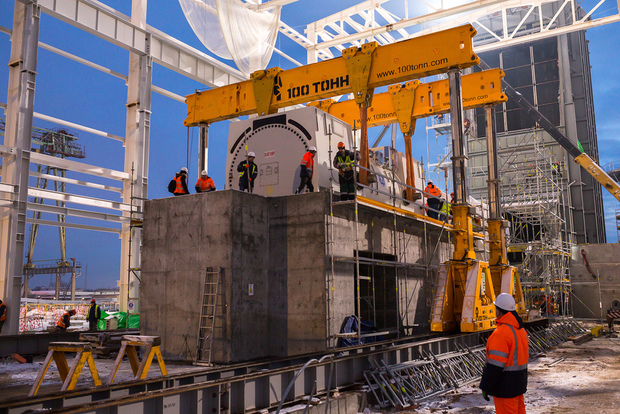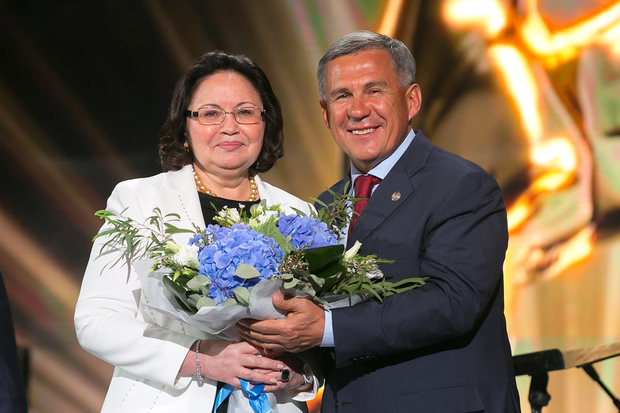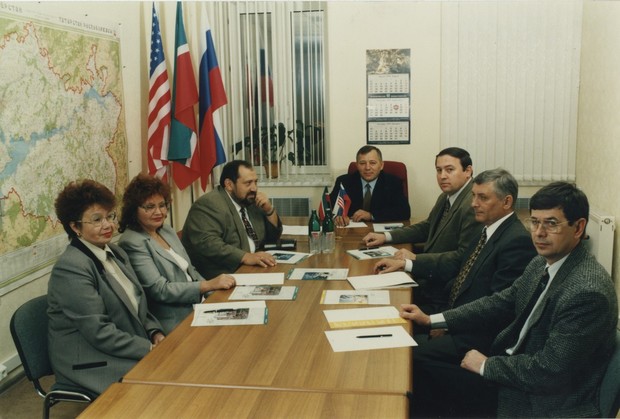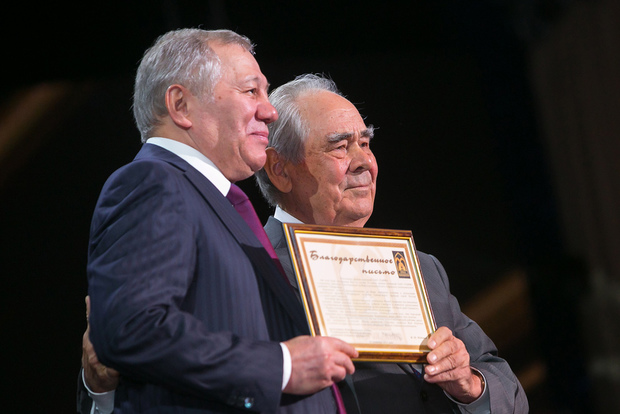TAIF: formation of strength for good
'What would have happened if there had not been these brave guys at the beginning of Perestroika?' the state advisor of Tatarstan Mintimer Shaimiev asks himself this uneasy question speaking about TAIF holding. The history of its appearance is closely connected with the life and economy of the republic. The scale of the industrial business and the intensity of its development causes many questions and myths around TAIF. All people want to know where the largest business empire of not only Tatarstan but also Russia stems from. How did the entrepreneurs manage to develop their business from sugar import and sale of oil products for the production of modern high-tech petrochemical goods, go through Perestroika and all crises without losing their positions? Finally, where did they take billions of investments for the construction of factories that have no equals in Russia now? We met with those who have been ruling TAIF for 25 years in order to hear honest answers to these questions and prepared a cycle of materials for publication. On the eve of TAIF shareholder meeting, we offer you to read an exclusive material of Realnoe Vremya online newspaper about the history of the formation of TAIF GC. Part 1.
Third of GRP of Tatarstan
It's a Saturday morning. Further details of the joint closer cooperation with GE on a large modernization of the energy system of Tatarstan based on up-to-date technologies were discussed after a meeting with the Vice-President of General Electric John G. Rice in the head office of TAIF on Friday. So, a powerful gas turbine unit in CHP-3 of Kazan, which is a 100% subsidiary of TGC-16, will be put into operation no later than the first quarter of 2017. Then there was held the next session on the coming meeting with the head of Linde AG Wolfgang Buechele next week. His chemical company is installing a Hydrogen Production Unit in an ambitious project of TAIF – Heavy Residues Deep Conversion Complex… It's only the beginning of the day, which is a day off for many people, but not for the director general of TAIF Albert Shigabutdinov, whose multisectoral holding generates a profit equal to 615bn rubles and is one of the pillars of the economy of Tatarstan.

'Today the Group of Companies represents not only oil refining, petrochemistry and power engineering. It has construction and financial complex, including banking and telecommunications. It all forms the foundation of our republic. It is the reserve and the base we have in the republic. Every year we open new factories. Today Tatarstan is the largest plastic and synthetic rubber producer for a reason,' the President of Tatarstan Rustam Minnikhanov estimates the scale of the company. And, undoubtedly, no one of Shigabutdinov's team did not imagine that these results were attainable. 'During these 25 years of work, the most difficult thing was to imagine that all plans would become reality and in a greater volume,' a member of the board of directors of TAIF PJSC Aleksander Fridman says. But what thoughts did that cohort have, who created TAIF, that became an impetus? And where does the business accounting for the third of GRP of Tatarstan stem from?

Today the Group of Companies represents not only oil refining, petrochemistry and power engineering. It has construction and financial complex, including banking and telecommunications. It all forms the foundation of our republic
Unknown 39-year-old entrepreneur
Overthrow, August 1991. The collapse of the Soviet power. Mikhail Gorbachev declared the country and the world his resignation and self-liquidation of the former Soviet Union. The country, which had been existing for 70 years with command economy, disappeared in one day. And the country faced a gloomy reality with a sudden fall in the level of life of ordinary people instead of the change of the economic structure. A steep departure from the planned economy led to the severance of economic ties. Grocery shelves, which were not rich in the assortment before, became empty at once. It all happened against a background of the ruble that cheapened day after day…
Kazan Scientific Research Centre of Foreign Trade appeared at the period of the overall chaos. A newly appeared company started to provide the population with basic essentials. There was a great deal of organizations of this kind at that moment. However, the majority of them disappeared after a year of work. Albert Shigabutdinov, an unknown 39-year-old entrepreneur graduated from Kazan Aviation Institute, headed Kazan Scientific Research Centre of Foreign Trade. Rustem Sulteyev and Guzeliya Safina – reliable and tried and trusted people – became his first teammates. They form the skeleton of the new company.

Zero starting point
'By the end of the 80s of the last century, we, young people full of energy, had work experience in different organizations,' Rustem Sulteyev tells. 'We had constant conversations whose substance brought to one idea: time cannot be lost. We needed to create a firm and run a business, not a flash in the pan like 'buy-sell-ran away' but a serious firm that would unite different activities. And making profit, it would be possible to follow the interests of the republic and have a long-term perspective.'
Both the director general and the members of this team started their work from scratch. Before running a business, Albert Shigabutdinov worked in Tatrybkhoz for 5 years as deputy director general, worked in construction, supply and sales. He understood that the enterprise would go down if key decisions were not made. But he did not manage to achieve any changes when everything changed. People who Shigabutdinov knew in the institute, Komsomol, student construction brigades, started a private business and organized cooperatives. And he understood he needed a free-floating adventure.

Life at a rapid pace
'I knuckled down to work,' Albert Shigabutdinov tells. 'And the first barrier appeared immediately. There was no foundation that would legally regulate the entrepreneurship.' He did not use to drop back. This is why he started to solve the problem and spent 1,5 years developing the article on his own. The businesspeople brought 14 containers of clothes and shoes, a part of them was designed for kids, from Singapore, Malaysia and Hong Kong at their own expense because there was an endemic deficit of everything. The investments of businesspeople made a good profit and allowed to give a part of the clothes to charity against a background of a sudden turnaround in dollar – the dollar was 4 times cheaper before the deal.
Cigarette crisis took place at the same time. 'It was a usual thing to see people looking for stubs on the streets. Then deputy chairman of Kazan Municipal Executive Committee Rashit Faskhutdinov asked us to join this process and solve the problem,' Albert Shigabutdinov tells. And when smokers organized mass strikes lying on the rails, Shigabutdinov delivered huge lots of cigarettes – 40 containers – which was sold during three years.
Then sugar was delivered. It was in deficit at that time and was in demand among the population. It was a new victory that added confidence to their own power and possibilities. The business grew, Kazan Scientific Research Centre of Foreign Trade delivered up to 10,000 cars, graders, new fire engines and automobiles to Tatarstan. 'Now the young generation won't probably believe what happened at that moment, when it was impossible to buy a car even having money. Although factories of AZLK (Moskvitch maker) and VAZ were awash with cars, they were not sold. It happened because economic ties between enterprises and regions were broken: earlier Moscow was the regulator, the distribution was carried out by Gossnab (State Supply of the USSR). And when The Soviet Union stopped existing, the ties between producers and consumers destroyed almost in a flash,' Albert Shigabutdinov tells.

Life went on at a rapid pace. 'We managed to do too much in a day, while other people would need a whole week. Car wheels covered up to thousands of kilometres per day,' Albert Shigabutdinov remembers.
Shigabutdinov chose people like him, who got used to achieving results through a hard work without counting the time spent at work.
Missing links in the consumer-producer chain
At that times Kazan Scientific Research Centre of Foreign Trade sold cars, and its business partner AvtoVAZ asked it to organize the delivery of tyres and polyester film needed for car production. 'Initially, we went to Nizhnekamskneftekhim who produced rubber but whose sales was in a difficult situation. So, we exchanged it for tyre made in Yugoslavia using a system of barter. We delivered the tyres to AvtoVAZ and organized the supply of a new raw material for synthetic rubbers for Nizhnekamskneftekhim,' Albert Shigabutdinov tells.
This positive experience helped the company to build a new business model and use it to fill the missing links in the consumer-producer chain from A to Z. Moreover, other types of products, which were not easily sold by very enterprises at that moment, were added to the commodity turnover – tyres, rubber and diesel fuel.
However, the activity of Kazan Scientific Research Centre of Foreign Trade stopped to deal with just commercial deals quite quickly and was noticed in governmental authorities, especially when the company started to sell petrochemical products and entered into correspondence with the Cabinet of Ministers in order to improve their quality and increase volumes. It's clear that huge investments were needed to improve production technologies of the petrochemistry.
Then they seriously thought about the creation of an international investment company to attract capital and invest it in the economy of our republic. It was the foundation for the transformation of Kazan Scientific Research Centre of Foreign Trade to TAIF PJSC in 1995. A historical meeting with the participation of the first President of Tatarstan Mintimer Shaimiev was held in the Kazan Kremlin where it was decided to create TAIF investment company based on Kazan Scientific Research Centre of Foreign Trade.
Heightened attention
The country and NKS Trading Inc. (USA) were the main founders of the company. The government introduced its share by small share stocks of enterprises of the republic that were privatized. The American partners made the greatest investment in Tatarstan at that moment: they invested $10m in the authorised capital and became owners of over the third of the shares of the company. By the way, the businesspeople of Kazan Scientific Research Centre of Foreign Trade acquainted with this company at the beginning of the 90s – they met in Transneft and Transneftproduct. But they started to cooperate closely after an unpleasant but characteristic for that period case. In 1992, Kazan Scientific Research Centre of Foreign Trade supplied diesel fuel at $6m to one American businessman, but he did not pay the delivery. Representatives of NKS Trading helped to address the FBI and United States Department of Justice. So, litigations began. Then mutually beneficial supply of petrochemical products started. This way, the American began partners first and co-owners of TAIF later on.
TAIF was paid a special attention almost from the first days. 'Well-wishers' appeared all of a sudden. They accepted the appearance of the company very critically. It is easy to opine for onlookers alleging that we came when everything was prepared. But one thing is when something is delivered on a silver platter and the other when they give an opportunity to work. In general, the administration of the republic and shareholders set difficult tasks to TAIF as an investment company: to work on effectiveness improvement of the regional petrochemical enterprises. And today we see that having set an orientation to stop the fall and stabilize the work of the enterprises, reach indicators of the previous successful years and multiply the result and make the company a leader in the sector, they managed to not only improve their effectiveness but also modernize factories and launch new ambitious projects. It is possible only when enterprises are at the forefront providing the progress of Tatarstan and Russia.
With a feeling of prospect and immunity to problems
'What would have happened if there had not been these brave guys at the beginning of Perestroika?' the state advisor of Tatarstan Mintimer Shaimiev asks himself a question. 'It is difficult to imagine. It was such an important moment. Running a diversified business activity, they were smart to unite everything in one holding and start to earn during Perestroika.'

Running a diversified business activity, they were smart to unite everything in one holding and start to earn during Perestroika.
The successful experience of TAIF Group of Companies depends on people, without a doubt. It is a tried and tested team that confidently handled all economic challenges. 'Tribute should be paid, TAIF gathered a team of good specialists, people who feel the perspective,' the director general of Tatneftekhiminvest-holding Rafinat Yarullin opines. Indeed, people are the foundation whatever is the measure of success. 'We gathered strong professionals under our wing who are confident in their strength and optimistically looking to the future,' the first deputy director general for Production and Sales in TAIF PJSC Rustem Sulteyev.
During these years, TAIF GC carried our 37 largest projects, modernized its factories, built new plants and got necessary for the country products. We wrote about these projects, the sequence of their appearance, what business groups were in good odour in the 90s and what priorities and ambitious plans the holding has today that favour a rapid development of the economy and growth of people's well-being: formation of a civilized customs infrastructure through Karsar, integration of Tatarstan to the stock market of Russia through TAIF-Invest, appearance of the first regional GSM mobile operator and development of their telecommunication projects, strengthening positions of Kazanorgsintez, Nizhnekamskneftekhim and formation of TAIF-NK. Our further materials will be about what happened in the head office of the company at that time, the price of the implementation of transfer projects and difficulties in the modernization of the enterprises of the GC in Shigabutdinov's team.